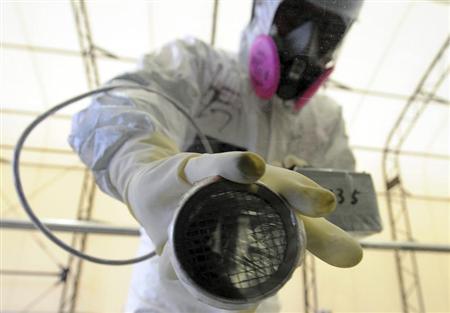Japan may restart reactors in a year; Fukushima situation worsens
Date: 10-Jul-13
Country: JAPAN
Author: Kentaro Hamada and Antoni Slodkowski

A worker takes radiation readings on the window of a bus at the
screening point of the Tokyo Electric Power Company's (TEPCO)
tsunami-crippled Fukushima Daiichi nuclear power plant in Fukushima
prefecture June 12, 2013.
Photo: Toshifumi Kitamura
Japan may restart several reactors shut down by the Fukushima nuclear crisis in about a year, a senior regulator said in an interview on Tuesday, a day after new safety rules went into effect designed to avoid a repeat of the disaster.
At the Fukushima Daiichi nuclear plant north of Tokyo, the site of the world's worst atomic disaster since Chernobyl in 1986, the situation took a turn for the worse as radiation levels in groundwater soared, suggesting highly toxic materials from the plant are now close to the Pacific Ocean.
But Japan is forging ahead with attempts to restart idled reactors in the face of a skeptical public, after Fukushima highlighted weak oversight of the industry.
That is meant to change with the new rules.
Getting units restarted is a key government goal to reduce the import bill for fossil fuel to run conventional stations. Only two of Japan's 50 reactors are connected to the grid and operators applied to restart 10 on Monday.
"Some units are projected (to restart) one year from now, though I don't know how many," Kenzo Oshima, a commissioner of Japan's Nuclear Regulation Authority, told Reuters. "It is hard to imagine that all the applications would be rejected, though we don't know what the outcome will be at the moment."
He did not identify the reactors that are likely to restart.
SITUATION WORSENS
Tokyo Electric Power Co, the operator of the Fukushima station, hit by the March 2011 earthquake and tsunami, said that an observation well between the damaged reactor No. 2 and the sea showed levels of radioactive caesium-134 were 90 times higher on Monday than they had been the previous Friday.
Tokyo Electric, also known as Tepco, said it detected caesium-134 at 9,000 becquerels per liter, 150 times above Japan's safety standard. A becquerel is a measure of the release of radioactive energy.
The reading for caesium-137, with a half life of 30 years, was some 85 times higher than it had been three days earlier.
The latest findings, 25 meters (yards) from the sea, come a month after Tepco detected radioactive caesium in groundwater flowing into its wrecked plant far from the sea on elevated ground. The level of caesium found in June was much lower than the amount announced on Tuesday.
The spike, combined with recent discoveries of high levels of radioactive elements like tritium and strontium, suggest that contaminated water is spreading toward the sea side of the plant from the reactors sitting on higher ground.
"We don't know what is the reason behind the spike," Tepco spokeswoman Mayumi Yoshida told Reuters. "We're still looking to determine the causes behind it."
The operator has been flushing water over the three reactors to keep them cool for more than two years, but contaminated water has been building up at the rate of an Olympic-size swimming pool per week.
In April, Tepco warned it may run out of space to store the water and asked for approval to channel what it has described groundwater with low levels of radiation around the plant and to the sea through a "bypass". Local fishermen oppose the proposal.
Tepco also announced that the plant's manager at the height of the crisis, when three reactors underwent meltdowns, died on Tuesday of oesophageal cancer - unrelated to his duties.
Masao Yoshida was widely credited with preventing the situation from spiraling out of control when he ignored an order from Tepco executives to stop pouring seawater over the reactors to keep them from overheating further.
He was one of a skeleton group of staff, known as the Fukushima 50, who remained at the plant at the height of the crisis, but he rarely spoke publicly about his experiences.
(Additional reporting by Osamu Tsukimori; Editing by Aaron Sheldrick and Ron Popeski)
![]()
© Thomson Reuters 2013 All rights reserved